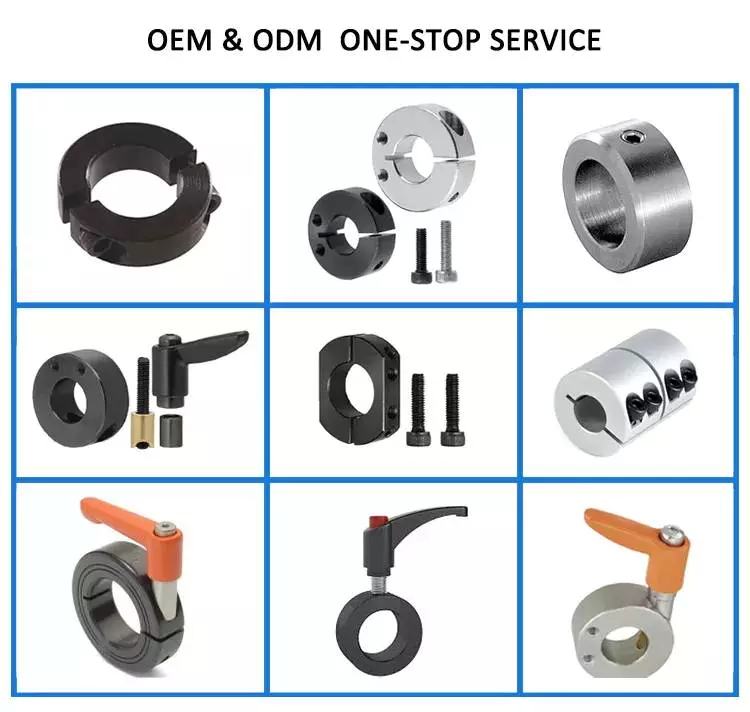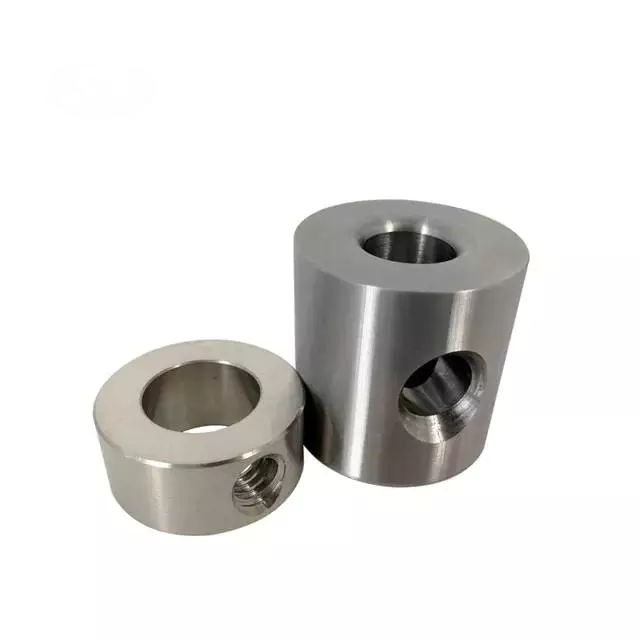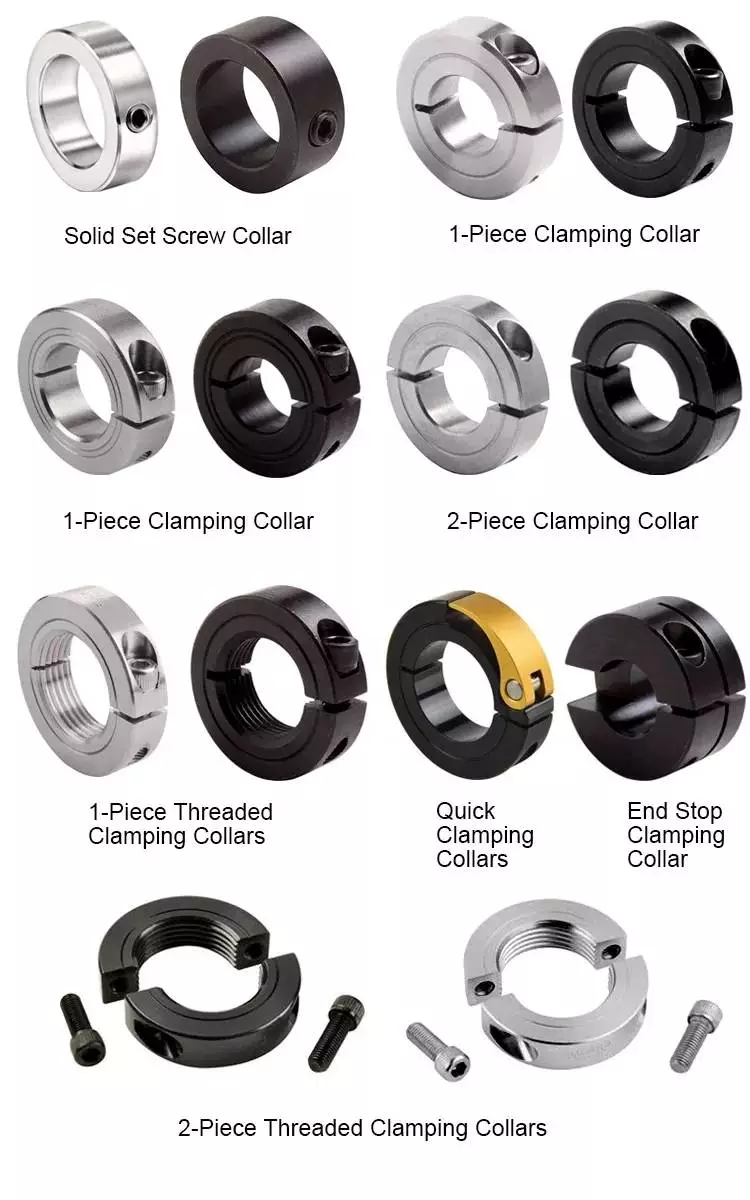Product Description
| Basic Info. of Our Customized CNC Machining Parts | |
| Quotation | According To Your Drawings or Samples. (Size, Material, Thickness, Processing Content And Required Technology, etc.) |
| Tolerance | +/-0.005 – 0.01mm (Customizable) |
| Surface Roughness | Ra0.2 – Ra3.2 (Customizable) |
| Materials Available | Aluminum, Copper, Brass, Stainless Steel, Titanium, Iron, Plastic, Acrylic, PE, PVC, ABS, POM, PTFE etc. |
| Surface Treatment | Polishing, Surface Chamfering, Hardening and Tempering, Nickel plating, Chrome plating, zinc plating, Laser engraving, Sandblasting, Passivating, Clear Anodized, Color Anodized, Sandblast Anodized, Chemical Film, Brushing, etc. |
| Processing | Hot/Cold forging, Heat treatment, CNC Turning, Milling, Drilling and Tapping, Surface Treatment, Laser Cutting, Stamping, Die Casting, Injection Molding, etc. |
| Testing Equipment | Coordinate Measuring Machine (CMM) / Vernier Caliper/ / Automatic Height Gauge /Hardness Tester /Surface Roughness Teste/Run-out Instrument/Optical Projector, Micrometer/ Salt spray testing machine |
| Drawing Formats | PRO/E, Auto CAD, CZPT Works , UG, CAD / CAM / CAE, PDF |
| Our Advantages | 1.) 24 hours online service & quickly quote and delivery. 2.) 100% quality inspection (with Quality Inspection Report) before delivery. All our products are manufactured under ISO 9001:2015. 3.) A strong, professional and reliable technical team with 16+ years of manufacturing experience. 4.) We have stable supply chain partners, including raw material suppliers, bearing suppliers, forging plants, surface treatment plants, etc. 5.) We can provide customized assembly services for those customers who have assembly needs. |
| Available Material | |
| Stainless Steel | SS201,SS301, SS303, SS304, SS316, SS416, etc. |
| Steel | mild steel, Carbon steel, 4140, 4340, Q235, Q345B, 20#, 45#, etc. |
| Brass | HPb63, HPb62, HPb61, HPb59, H59, H62, H68, H80, etc. |
| Copper | C11000, C12000,C12000, C36000 etc. |
| Aluminum | A380, AL2571, AL6061, Al6063, AL6082, AL7075, AL5052, etc. |
| Iron | A36, 45#, 1213, 12L14, 1215 etc. |
| Plastic | ABS, PC, PE, POM, Delrin, Nylon, PP, PEI, Peek etc. |
| Others | Various types of Titanium alloy, Rubber, Bronze, etc. |
| Available Surface Treatment | |
| Stainless Steel | Polishing, Passivating, Sandblasting, Laser engraving, etc. |
| Steel | Zinc plating, Oxide black, Nickel plating, Chrome plating, Carburized, Powder Coated, etc. |
| Aluminum parts | Clear Anodized, Color Anodized, Sandblast Anodized, Chemical Film, Brushing, Polishing, etc. |
| Plastic | Plating gold(ABS), Painting, Brushing(Acylic), Laser engraving, etc. |
FAQ:
Q1: Are you a trading company or a factory?
A1: We are a factory
Q2: How long is your delivery time?
A2: Samples are generally 3-7 days; bulk orders are 10-25 days, depending on the quantity and parts requirements.
Q3: Do you provide samples? Is it free or extra?
A3: Yes, we can provide samples, and we will charge you based on sample processing. The sample fee can be refunded after placing an order in batches.
Q4: Do you provide design drawings service?
A4: We mainly customize according to the drawings or samples provided by customers. For customers who don’t know much about drawing, we also provide design and drawing services. You need to provide samples or sketches.
Q5: What about drawing confidentiality?
A5: The processed samples and drawings are strictly confidential and will not be disclosed to anyone else.
Q6: How do you guarantee the quality of your products?
A6: We have set up multiple inspection procedures and can provide quality inspection report before delivery. And we can also provide samples for you to test before mass production.
/* March 10, 2571 17:59:20 */!function(){function s(e,r){var a,o={};try{e&&e.split(“,”).forEach(function(e,t){e&&(a=e.match(/(.*?):(.*)$/))&&1
| Condition: | New |
|---|---|
| Certification: | CE, RoHS, GS, ISO9001 |
| Standard: | DIN, ASTM, GOST, GB, JIS, ANSI, BS |
| Customized: | Customized |
| Material: | Alloy |
| Application: | Metal Recycling Machine, Metal Cutting Machine, Metal Straightening Machinery, Metal Spinning Machinery, Metal Processing Machinery Parts, Metal forging Machinery, Metal Engraving Machinery, Metal Drawing Machinery, Metal Coating Machinery, Metal Casting Machinery |
| Samples: |
US$ 3/Piece
1 Piece(Min.Order) | |
|---|
| Customization: |
Available
| Customized Request |
|---|

Are there guidelines on selecting shaft collars for applications with varying loads?
Yes, there are guidelines available to help in selecting shaft collars for applications with varying loads. When choosing shaft collars, it is important to consider the expected load conditions to ensure proper performance and prevent failures. Here are some guidelines to consider:
- Load Capacity Ratings: Shaft collars are typically assigned load capacity ratings by manufacturers. These ratings indicate the maximum load that a collar can withstand without deformation or failure. When selecting shaft collars for applications with varying loads, it is important to choose collars with load capacity ratings that exceed the maximum expected load in the application. This provides a safety margin and ensures reliable performance even under fluctuating load conditions.
- Dynamic Load Considerations: In applications with varying loads, it is important to consider both the static and dynamic load conditions. Static load refers to the constant load applied to the shaft collar, while dynamic load refers to the fluctuating or cyclic loads. The dynamic load can be higher than the static load due to factors such as vibrations, impacts, or operational variations. Ensure that the selected shaft collars have sufficient dynamic load capacity to handle the varying loads without premature failure.
- Material Strength: The material strength of the shaft collar is a critical factor in load-bearing capacity. Different materials, such as steel, stainless steel, aluminum, or plastic, have varying strength properties. For applications with varying loads, consider selecting shaft collars made from materials with higher strength and fatigue resistance to ensure they can withstand the load fluctuations without experiencing permanent deformation or fatigue failure.
- Design Features: Certain design features of shaft collars can enhance their load-bearing capacity and performance. For example, collars with a wider width or thicker cross-section can provide greater strength and resistance against deformation. Additionally, collars with multiple set screws or clamping mechanisms can distribute the load more evenly and provide a secure grip on the shaft, reducing the risk of slippage or misalignment under varying loads.
- Consulting with Manufacturers or Engineers: If you have specific application requirements or complex load conditions, it is advisable to consult with shaft collar manufacturers or mechanical engineers. They can provide expert guidance and recommend suitable collar designs, materials, and sizes based on the specific load variations in your application. Manufacturers often have engineering support teams that can assist in selecting the appropriate shaft collars for varying load conditions.
Remember that the selection of shaft collars for applications with varying loads should be based on a thorough understanding of the load characteristics, anticipated load range, and the specific requirements of the application. It is essential to choose collars that can safely and reliably handle the maximum expected loads to ensure optimal performance and prevent premature failure.

Can I find guidelines on lubricating and maintaining shaft collars for optimal performance?
Yes, guidelines on lubricating and maintaining shaft collars for optimal performance can be found. Proper lubrication and maintenance are essential for ensuring the smooth operation and longevity of shaft collars. Here are some common sources where you can find guidelines on lubricating and maintaining shaft collars:
- Manufacturer Websites: Many shaft collar manufacturers provide guidelines or recommendations for lubrication and maintenance on their websites. These guidelines may include information on the type of lubricant to use, the frequency of lubrication, and specific maintenance procedures. Visiting the websites of specific collar manufacturers and exploring their resources section or product documentation can help you find the lubrication and maintenance guidelines you need.
- Product Manuals or Documentation: When purchasing shaft collars, they often come with product manuals or documentation that include instructions for lubrication and maintenance. These manuals may provide step-by-step procedures, recommended lubricants, and maintenance schedules. Referencing the manuals or documentation that accompany your specific collar model can provide valuable guidance on how to properly lubricate and maintain your shaft collars.
- Industrial Machinery Handbooks: Handbooks or reference books related to industrial machinery or mechanical components often include sections on lubrication and maintenance practices. These resources can provide general guidelines and best practices for maintaining various types of mechanical components, including shaft collars. Checking reputable handbooks or reference books in the field of mechanical engineering can offer insights into lubrication techniques and maintenance procedures for optimal performance.
- Online Forums and Communities: Engaging with online industrial forums, discussion boards, or communities dedicated to mechanical components can provide access to valuable insights and experiences shared by professionals and experienced users. By posting inquiries about lubrication and maintenance techniques for shaft collars, you can gather practical advice, tips, and recommendations from individuals who have hands-on experience in the field.
- Consulting with Engineers or Experts: If you have access to engineers or experts in mechanical engineering or industrial equipment, they can provide personalized guidelines for lubricating and maintaining shaft collars based on your specific application and operating conditions. These professionals can consider factors such as the type of collar, the environment in which it operates, and any specific requirements you may have. They can offer insights and recommendations tailored to your needs.
When following lubrication and maintenance guidelines for shaft collars, it is important to adhere to the manufacturer’s recommendations and consider the specific characteristics of your operating environment. Proper lubrication techniques and regular maintenance can significantly contribute to the optimal performance and longevity of your shaft collars.

What are the key features to consider when selecting shaft collars for specific machinery?
When selecting shaft collars for specific machinery, there are several key features to consider. These features help ensure that the chosen shaft collars are compatible with the machinery and can perform effectively in the intended application. Here are the key features to consider:
- Shaft Size and Material: The first consideration is the size and material of the shaft. Shaft collars are available in various sizes to accommodate different shaft diameters. It is crucial to accurately measure the shaft diameter and choose a collar that matches it. Additionally, consider the material of the shaft, such as steel, stainless steel, or aluminum, and select a collar material that is compatible with it to prevent galvanic corrosion or other compatibility issues.
- Collar Material: Shaft collars are available in different materials, including steel, stainless steel, aluminum, and plastic. The choice of collar material depends on factors such as the application environment, load requirements, and desired durability. For example, stainless steel collars are often preferred for corrosive or high-temperature environments, while plastic collars may be suitable for lighter-duty applications or situations where avoiding marring or scratching the shaft is important.
- Collar Type: Consider the type of collar that best suits the specific machinery and application. The common collar types include set screw collars, clamping collars, one-piece solid collars, two-piece split collars, threaded collars, hinged collars, flanged collars, and specialty collars. The choice depends on factors such as ease of installation, adjustability, space limitations, and the need for specific features like indexing, quick release, or torque limiting.
- Load Capacity: Evaluate the load capacity requirements of the machinery. The shaft collars should be capable of withstanding the expected loads and forces without deformation or failure. Consider factors such as the torque, axial force, and radial force that the collar will experience in the application and choose a collar with an appropriate load rating to ensure reliable and safe operation.
- Operating Conditions: Take into account the operating conditions in which the machinery operates. This includes factors such as temperature, humidity, vibration, and exposure to chemicals or contaminants. Ensure that the chosen shaft collars are designed to withstand these conditions and have appropriate corrosion resistance, temperature tolerance, and environmental sealing if needed.
- Installation and Adjustment: Consider the ease of installation and adjustment of the shaft collars. Some collars, such as set screw collars, are relatively easy to install and require minimal tools. Others, like clamping collars, may require more complex assembly or adjustment procedures. Choose a collar that aligns with the available installation and adjustment methods in your machinery and suits the desired level of convenience or precision.
- Compatibility with Other Components: Assess the compatibility of the shaft collars with other components in the machinery, such as bearings, gears, pulleys, or couplings. Ensure that the collar design and dimensions allow for proper alignment, clearance, and interaction with these components. Consider any specific requirements or constraints imposed by the machinery design or the need to interface with existing components.
- Cost and Availability: Finally, consider the cost and availability of the chosen shaft collars. Compare prices from different suppliers or manufacturers to ensure that the collars offer good value for money. Additionally, assess the availability of the collars from reliable sources to avoid delays or difficulties in obtaining replacements or additional collars when needed.
By carefully considering these key features, you can select shaft collars that are well-suited for the specific machinery, ensuring proper functionality, reliable performance, and compatibility with the application requirements.


editor by CX 2024-01-04